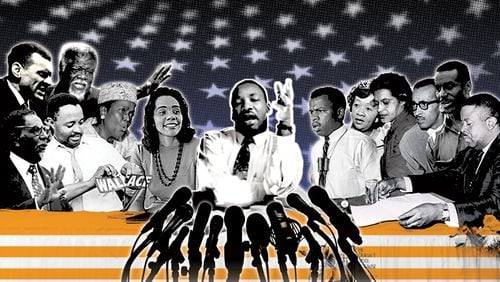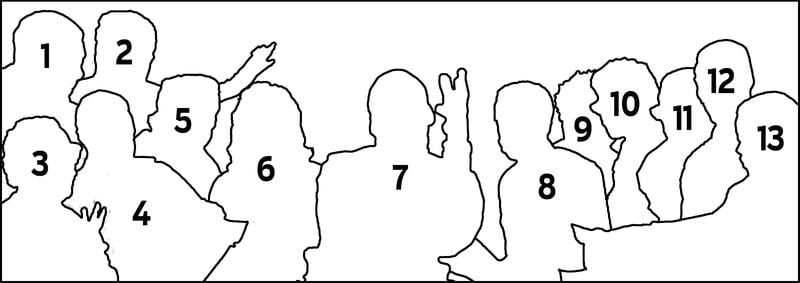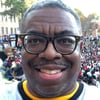During his time as an active civil rights leader, roughly from 1955 until 1968, Martin Luther King Jr. surrounded himself with a dedicated group of advisors, who helped him strategize, marched with him, and who were at his side at his death.
“The victims of Jim Crow decided that they were gonna make a difference,” said Courtland Cox, a founder of the Student Nonviolence Coordinating Committee and the chairman of the SNCC Legacy Project. “They were a determining factor in ending it. What they did was narrow the contradictions that existed, particularly with the Declaration of Independence and the concept that all men are created equal.”
With the recent deaths of Joseph Lowery, C.T. Vivian and John Lewis, most of them are gone.
In the photo illustration above, AJC designer Richard Watkins, re-imagines, King’s court. See the numerical key below.
Credit: Ric Watkins
Credit: Ric Watkins
1. The Rev. C.T. Vivian – 1924-2020: On Feb. 16, 1965, Vivian challenged Dallas County Sheriff Jim Clark by passionately articulating the rights for Black residents of Selma to be able to vote. Clark punched Vivian down the stairs of the courthouse. Vivian, who years later would receive a Presidential Medal of Freedom, stood back up and continued making his point. Read more.
2. The Rev. James Orange – 1942-2008: Standing well over 6 feet tall and 300 pounds with a booming baritone voice and strong views, Orange was described as one of the “real soldiers of the movement ... a gentle giant,” who kept things peaceful. He joined the civil rights movement in 1957 as a Freedom Singer and was hired in 1965 by the Southern Christian Leadership Conference as a field staffer. Read more.
3. The Rev. Joseph Lowery – 1921-2020: Known as the “Dean of the Civil Rights Movement” in his later years, Lowery integrated buses in Mobile, Alabama, months before the Montgomery Movement. He was one of the founders of the Southern Christian Leadership Conference and its longest-serving president. After the historic election of Barack Obama, Lowery delivered the benediction at his inauguration. Read more.
4. Hosea Williams – 1926-2000: “Unbossed and unbought,” Williams marched alongside John Lewis on Bloody Sunday, where he was among the dozens who were beaten by Alabama state troopers. In 1970, he started Hosea’s Feed the Hungry and Homeless, which is still run by his daughter. Read more.
5. Ella Baker – 1903-1986: A force behind the scenes, Baker played the mentor role in the NAACP, then the Southern Christian Leadership Conference, working with W.E.B. Du Bois, Thurgood Marshall, A. Philip Randolph and King. Over Easter in 1960, she invited a group of Black college students to Shaw University to talk about activism. At the meeting, attended by John Lewis, the Student Nonviolent Coordinating Committee was formed. Read more.
6. Coretta Scott King – 1927-2006: The wife of Martin Luther King Jr., she was by his side since they were married in 1953, until his death. Just months after his death in 1968, she started the Martin Luther King, Jr. Center for Nonviolent Social Change. In 1986, her efforts to keep her husband’s memory alive led to the establishment of the King federal holiday. Read more.
7. The Rev. Martin Luther King Jr. – 1929-1968: The undisputed leader of the civil rights movement, King was at the center of nearly every major offensive. He delivered the landmark, “I Have a Dream,” speech at the 1963 March on Washington and won the 1964 Nobel Peace Prize. He was assassinated in Memphis on April 4, 1968. Read more.
8. John Lewis – 1940-2020: The “Boy from Troy,” earned his civil rights stripes as a member of the Nashville Student Movement and a Freedom Rider. He was the youngest speaker at the March on Washington and led marchers across the Edmund Pettus Bridge on Bloody Sunday. He represented parts of Atlanta for 33 years as a member of the United States House of Representatives. Read more.
9. Dorothy Height – 1912-2010: As the president of the National Council of Negro Women, focusing on gender issues, she was one of the powerful women in the movement. She also served as the national president of Delta Sigma Theta Sorority from 1947 to 1956. Read more.
10. Rosa Parks - 1913–2005: “The Mother of the Freedom Movement,” Park’s 1955 refusal to give up her seat to a white man on a Montgomery bus launched the modern civil rights movement. Martin Luther King Jr., an unknown 26-year-old pastor was chosen to lead the 381-day Montgomery Bus Boycott. Read more.
11. Wyatt T. Walker - 1928-2018: An early board member of the Southern Christian Leadership Conference, he was also one of the founders of the Congress for Racial Equality. But he helped raise the SCLC to national prominence as the group’s executive director. Read more.
12. The Rev. Fred Shuttlesworth - 1922- 2011: One of the most vocal and fiery leaders of the civil rights movement, Shuttlesworth was a member of the SCLC and active in Birmingham. On Christmas Day 1956, his Birmingham home was bombed. The next day, he led 250 people in a protest of segregation on buses in Birmingham. Read more.
13. The Rev. Ralph David Abernathy – 1926-1990: King’s closest ally, Abernathy started with King in Birmingham and was with King on the balcony of the Lorraine Motel in 1968 when he was assassinated. He succeeded King as president of the SCLC. Read more.
STILL MARCHING
Andrew Young: A key King lieutenant who went on to a successful life in politics and business. He became a United Nations Ambassador under President Jimmy Carter and a two-term mayor of Atlanta.
Jesse Jackson: Started the Rainbow/PUSH organization in 1971 before running for president in 1984 and 1988.
Bernard Lafayette: A founder of the Nashville Student Movement and SNCC, he went on to become a scholar and college president. He is currently the chairman of the SCLC board.
Diane Nash: As a student at Fisk University, Nash emerged as a key strategist with the Nashville Student Movement and SNCC.
Bob Moses: A member of SNCC, Moses is a co-founder of the Mississippi Freedom Democratic Party and was an organizer of the 1964 Freedom Summer. In 1982, he used a MacArthur Genius Grant to start the Algebra Project, a minority math-based teaching initiative that emphasizes community activism.









